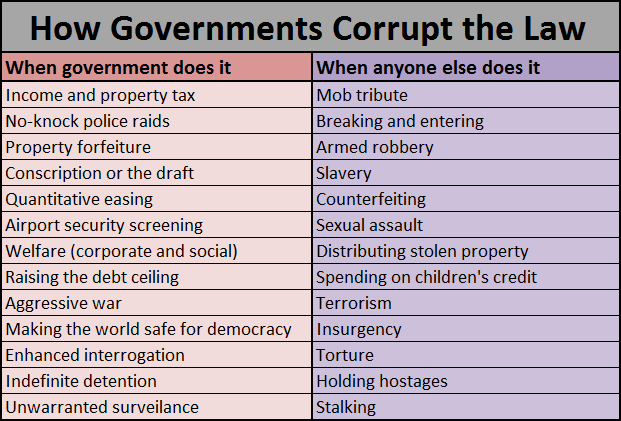G. Gordon Liddy’s When I Was a Kid, This Was a Free Country, Part 1
Posted By Beau Albrecht On In North American New Right | Comments DisabledPart 1 of 2 (Part 2 here [2])
The late, great G. Gordon Liddy certainly was a remarkable individual. History best knows him as the most colorful of the Watergate burglars, and the only one who kept his mouth shut throughout. After the statute of limitation expired, he had plenty to say [3] about his motivations, especially in his autobiography Will. Leading up to that misadventure, he had been a member of the FBI when it was more respectable. It had begun to take on a politicized role [4] as a secret police force, including the use of provocateurs and entrapment tactics in the usual “FBI foils FBI plot” setup, but things weren’t as bad as they are now [5]. Basically, they had more to do with catching crooks back then.
Apart than that, G. Gordon Liddy was a hoot. His razor tongue was legendary. Given his classical education, the G-Man is somewhat like Revilo P. Oliver armed with brass knuckles and a .357 Magnum. During the 1990s he became the second-most controversial American talk show host in history following some bad-optics remarks. (Ezra Pound is still number one; he remains a remarkably tough act to beat [6].)
He also was known for developing his willpower to conquer fear. This led to the infamous barbecued rat incident [7]. Developing willpower also gave him the ability to endure great pain. For instance, he’d skip the anesthesia at the dentist’s office when getting his teeth drilled. Inspired by his example, I tried that myself as a proof of concept. Although I withstood it, once was enough for me.
In the late 1980s I had the pleasure of seeing G. Gordon Liddy debate Timothy Leary, whose house he raided in 1966. Despite their personal history, the two apparently got along quite well. I’ll speculate that perhaps on further reflection, the famous LSD aficionado wasn’t too heartbroken about the outcome. Getting busted served as a means of pest control, evicting the gaggle of dirty hippies who Bogarted his dope and pooped all over his mansion. Leary and his wife ended up beating the weed possession charges on a technicality.
I therefore had high expectations for his book When I Was a Kid, This Was a Free Country. Although it did have its moments, I regret to say that parts of it were uneven. For context, this came out in 2002, fresh on the heels of the Stupid Plane Trick. Moreover, it was around the beginning of Amurrica’s effort to spread democracy throughout the Middle East via bombs and bullets. Boy howdy, they were gonna love us for it, too; after all, they’re just the same as us and want the same things that we do, right? All that sure turned out great, didn’t it?
Prologue: Frank Smith Returns to France
The book opens with Liddy describing a trip to the D-Day landing sites in Paris, accompanied by a veteran of the battle. The description of the fateful event is quite grim, including the following:
The carnage began at sea when the troops had to descend rope cargo nets, then drop into the small boats waiting to deliver them to shore. Those who missed fell into the sea and, burdened with their packs, drowned. Others were delivered to sandbars way offshore. They drowned. Specially prepared tanks with “skirts” added to enable them to float were put into the heaving sea. Half promptly sank, drowning their crews. Paratroopers were dropped into the sea. They drowned. All cried out for help to the passing landing craft. None stopped to aid them. Orders.
 [9]
[9]You can buy Beau Albrecht’s Space Vixen Trek here [10].
The intention is to instill a deep and reverent awe for the sacrifices the Greatest Generation endured. (Liddy noted 200,000 dead in that battle, counting both sides.) That was quite a depressing thing to read. Those poor dupes! [11] They slaughtered the wrong pig, to paraphrase an apocryphal moment of clarity by Winston Churchill. I especially felt bad for those of my countrymen who had charged onto beaches and into withering gunfire, believing that they were defending America, freedom, and democracy. Instead, they were being sent into the meat grinder to serve globalism, help Zionism, and save Communism.
They put their lives on the line for a corrupt oligarchy that had hijacked their country. And the result of their heroism inspired by misplaced patriotism was the Cold War, involving decades of nuclear terror and a string of spit-in-your-eye wars which are still ongoing. Their sacrifice in blood, mandated by the will of politicians who had no right to tie the bootlaces of those they sent into battle, led to the present-day mess. In time, the country the D-Day invasion force fought and died for would be transformed into a multicultural pressure cooker, all against its public’s will. I wish that Liddy would’ve stopped to think about all this and — much like Pat Buchanan [12] — come to dissent from The System’s foundational myth [13], but it was not to be.
Liberties Lost
Born in 1930, the G-Man came of age in a country that was remarkably free. Although much mischief [15] was afoot in high places, the citizens still enjoyed liberty that would be difficult to comprehend today. The author enumerates some of that. It was unremarkable for kids to carry guns down the street — they were still available in hardware stores and via mail order — for target shooting. They could obtain explosives to make their own fireworks, too. Property owners could burn leaves and cut down trees as they pleased. It was okay to import a car without airbags. Moreover:
People were free to speak their minds, even if what they had to say was contemptible; people who didn’t like it were free to say so in no uncertain terms — anywhere, particularly in that bastion of ideas, the university. Property owners felt secure in the knowledge that their possessions could not be taken from them, and at the very least that they would be afforded due process of law. Everyone knew that if he injured someone, he would be liable for the money it took to make that person whole, but confident that if he had not caused the injury he could not be held liable under the law. As to what was or was not criminal conduct, or for the settlement of civil disputes, citizens looked to the laws of their respective sovereign states.
In the name of healthy paternalism, I might quibble about the benefit of some of this; after all, I’m a fascist that way. Still, the G-Man does make a pretty strong case here. Even this much is a bit dated by now. The nanny state kept galloping on, of course.
One unfortunate omission is that there’s no mention of the “Patriot Act,” a new measure at the time he was writing that turned the Fourth Amendment into toilet paper. Supposedly it was temporary, but it keeps getting renewed. If the “Patriot Act” really has helped prevent a single terrorist plot, or even been used to catch crooks, I haven’t heard about it. Maybe there were some other priorities.
G. Gordon Liddy may not have been in an ideal position to discuss domestic spying. Still, I would’ve let it slide. He could’ve put it like this: “When we bugged a couple of rooms at the Watergate Hotel, the press went berserk and screamed bloody murder about it to the high heavens. Now that the entire country’s phone calls are being recorded without a warrant, where’s the outrage?”
Americans and Their Guns
This began as a strong chapter. At first there are some personal anecdotes, then it goes into history. The author describes self-defense as a natural right, which we were aware of even back in the toga-and-sandals days:
Aristotle, born 384 B.C., criticized a plan by Hippodamos for a society in which only one class would bear arms, pointing out that the classes without arms would become “virtually the servants of those who do possess arms.” He observed that nature had equipped man to select and use a variety of weapons, as distinguished from the lower animals, which are restricted by nature to the tooth and claw with which they are born. Thus, the right to bear arms flows from the nature of man.
Other ancients are cited, too. Then, of course, the Founding Fathers get their turn:
Thus, Richard Henry Lee, a driving force behind the Bill of Rights, said, “To preserve liberty, it is essential that the whole body of the people always possess arms, and be taught alike, especially when young, how to use them.” Patrick Henry of Virginia, he of “give me liberty or give me death” fame, who opposed the Constitution, said, “The great object is, that every man be armed — Everyone who is able may have a gun.” James Madison, in The Federalist No. 46, excoriated the European governments that were “afraid to trust the people with arms” and stressed “the advantage of being armed, which the Americans possess over the people of almost every other nation.”
Whoa — based! Then Liddy describes the Second Amendment and what it really means. But most unfortunately, in the subsection “The Real Reasons for Gun Control,” things take a turn for the worse:
If, historically and grammatically, I am stating the obvious when I say that the right of the people to keep and bear arms is an individual right which the Second Amendment forbids the federal government to infringe, whence comes gun control? It comes from plain, simple, and ugly racism, that’s where. It is one more noxious legacy of slavery.
What he cites is scanty and mostly antiquated, but he does have some evidence for this. That much is to be expected, since the Founding Fathers did not set up the USA to be a paragon of multiracial pluralism. The one modern item the author mentions is this:
It is not a coincidence that Congress passed the Gun Control Act of 1968 in the wake of the black rioting that erupted following the assassination of Dr. Martin Luther King Jr. Whites were terrified as they watched whole sections of their cities engulfed in flames and buildings being looted. Blacks were terrified, too, many putting up makeshift signs saying “Black Owned” in an effort to spare the small businesses upon which their livelihoods depended. But blacks were not in a position to react with legislation — whites were. Senator Thomas Dodd of Connecticut had the 1938 German gun-control law that the Nazis used so effectively to disarm the Jews translated into English and then used it as the basis of the Gun Control Act of 1968, as Jay Simkin and Aaron Zelman showed in their book “Gun Control”: Gateway to Tyranny. Of course, the 1968 act didn’t name blacks as its object any more than the Nazi law of thirty years before had named Jews.
 [17]
[17]You can buy Greg Johnson’s The Year America Died here. [18]
There’s so much wrong with the paragraph above that it’s astounding. It’s remarkably silly to assert that Congress in 1968 was in the habit of passing covertly pro-white measures; their recent legislative history certainly speaks otherwise. On the other hand, anarcho-tyranny [19] is a much more plausible motive for gun control, along with the more idealistic sort of liberal Congressmen whose minds were so open that their brains fell out. Gun control isn’t about “racism”; it happens because politicians prefer unarmed peasants. Liddy realized this, as he discussed this elsewhere. For the icing on the cringe cake, the author even quotes the opinion of Eldridge Cleaver, a subhuman oxygen thief whose deranged prison memoirs have been used by Leftist professors to demoralize white students for decades.
Then there’s the tired old reductio ad hitlerum argument about gun control that keeps popping up coming from well-meaning conservatives who unfortunately watch too much television and don’t know what they’re talking about. They keep spreading the myth without doing the research — including Liddy, most unfortunately. I set that one straight in Deplorable Diatribes [20]:
[Gun control] got enacted in Weimar-era Germany with the 1919 confiscation law, Verordnung des Rates der Volksbeauftragen über Waffenbesitz. Quite amusingly, the guy who began running the show fourteen years later still gets blamed incessantly. The often-cited Waffengesetz of March 18, 1938 actually amounted to a partial deregulation.
Although Jews were exempted from the deregulation, gun control laws during the Third Reich weren’t as strict as one might expect. The based mischling Heinz Weichardt provided a telling personal experience [21] after he developed a half-baked plan to become a teenage gun retailer:
It was followed by the famous knock on the door, and on opening I faced three agents of the secret police (Gestapo). No hands in the pockets groping for hidden arms, no shouted orders or threats, only showing of identifications and the polite question if I had any firearms at home and if they could see them. I asked them in, got my guns and asked my mother to show the registration receipts. The disappointment of the rather mild-mannered gentlemen at the measly display was obvious and they asked about the whereabouts of one hundred Parabellums which I was suspected to harbor. My heart sank and I told them about my, now surely aborted, hoped-for big deal, which as yet had not been consummated. They looked greatly relieved and the man in charge said that a perfunctory search of our premises was in order. No drawers were ripped out and emptied, nothing was displaced or damaged — only a short look under beds into armoires and storage cabinets. When they were ready to leave the man in charge spotted a letter on the table with a Jewish-sounding name of the sender and being obviously informed about my mother’s racial background he very kindly admonished her that because of the new conditions prevalent to be especially careful and not to break any of the existing laws. With that they apologized for the inconvenience they had caused and left. My loaded guns remained on the table.
Henceforth, it would be great if conservatives would stop making reductio ad hitlerum arguments, or using the tired, old “The Democrats are the real racists [22]” line. It’s not going to win over liberals; they don’t care! “Raaaacist” and “nahtzee” are simply weaponized buzzwords [23] they use to inspire a knee-jerk reaction and stop debate. I’ll add that when G. Gordon Liddy was sent to an otherwise all-black prison and they started hooting at him while he was walking to the shower, his response was to start singing the “Horst Wessel Lied.” That worked; it shut them right up. Now that’s the spirit!
Education
This chapter begins with an endorsement of education as the way to get ahead in life. This includes personal details about Liddy’s scholastic street cred. (His mastery of the English language is quite obvious, I’ll add.) There are a few pokes at pedagogical fads, as well as public school in general. There’s very little mention of LGBT evangelism, but at the time it wasn’t yet a major agenda item. Rather, the chapter is mainly the usual litany of declining standards. Unfortunately, it takes a nosedive towards the end:
These are the people who have forced so many of our colleges and universities to drop required courses in Western civilization. These are the people who perpetuate racist quotas that were anathema to Dr. Martin Luther King Jr., whose most fervent desire was that all men be judged by the content of their character, not the color of their skin.
No, G-Man, no! Given his former occupation, he should’ve known better about that phony preacher [25] hyped up into a saint with a plastic halo. Oy, what is this goyische meshugges?
Those last two points demand further comment, for they get to the heart of what education — and this country — should be about. In recent years many colleges have watered down the emphasis on Western civilization. Rather than focusing on classic texts from Western civilization, many have added texts from Asia and Africa in an effort to make nonwhite Americans feel more included. This effort is born of the racist belief that Americans whose ancestors are not from Europe are somehow less American than those who are and that, therefore, they cannot relate to the texts and philosophies that gave birth to their American heritage.
Cringe! Unfortunately, this begins three wretched pages of civic nationalist pieties. Toward the end, it even sinks to race denialism.
I recall the canon controversy that Liddy described. This wasn’t about “inclusion” or other warm and fuzzy liberal pieties that may have served as advertising boilerplate in other places. It was quite explicitly anti-white, and they didn’t even bother trying to hide it at my university. I’ll add that during this time, several of the local (((campus activist types))) acted remarkably obnoxious and undignified; certainly not the best ambassadors for their people.
As for the long-standing controversy about race and intelligence that was reignited soon after with The Bell Curve, that’s the key to the matter. It shouldn’t be dodged in the name of avoiding controversy. Simply put, if we keep importing rapidly-breeding, low-IQ populations by the tens of millions, it should come as no surprise that scholastic standards are cratering. This isn’t rocket science here. As a group, Somalis won’t perform like Scandinavians no matter how well their schools are staffed and funded, and statistical outliers don’t disprove that. Unfortunately, the author pretended he didn’t know that while trying to fool the reader with universalist civnat hogwash. It’s not one of the book’s shining moments.
Another factor is dysgenic breeding in general, much of it happening since the deregulation of the sexual marketplace in the 1960s — but all that’s another story [26]. Looking back on the brilliant engineers and scholars who were in such abundance in the nineteenth century, I’d shudder to think how many average IQ points the country has lost since then. In any event, although there’s something to be said about teachers’ union bosses and Department of Education bureaucrats suffering from cranio-rectal impaction, there’s just no getting around a low-IQ problem with the student body. As they leave the schools and enter the workforce, obviously they become society’s problem.




